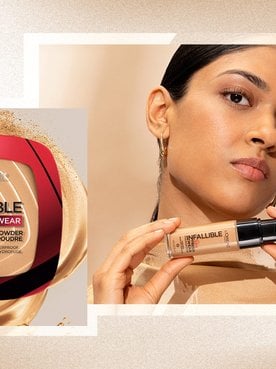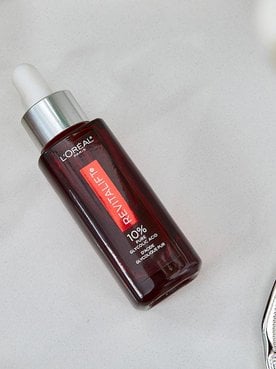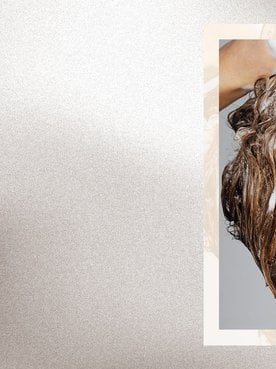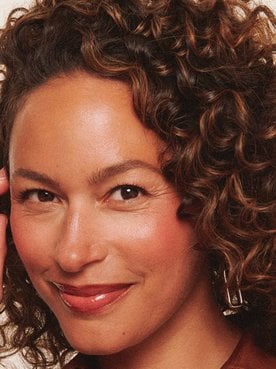In this article
- Is SPF 50 Better Than 30?
- How Strong is SPF 50 Sunscreen?
- SPF 30 vs. SPF 50 vs. SPF 100
- Is SPF 30 Enough for the Face?
- Should People with Certain Skin Conditions Use a Higher SPF?
- Does SPF 50 Clog Pores?
- Does SPF 50 Prevent Wrinkles?
- How To Choose the Right SPF for You
- Our Best SPF Moisturizers To Add To Your Routine
Ask any skincare enthusiast, “What is SPF in sunscreen?” and they’ll likely tell you that it’s what protects your skin against the sun’s damaging rays. That’s true—but it’s not the whole story. SPF stands for sun protection factor, and it’s a measure of how well a given formula can protect against UVB (sunburn-causing) rays. Most experts recommend using a formula with an SPF of 30 or greater, as SPF 30 sunscreen protects against roughly 97% of UV rays.
While no sunscreen can block 100% of UV rays, there are some circumstances in which you should heed the words “or greater” and opt for a formula with a higher SPF. We tapped board-certified dermatologist and L’Oréal Paris consultant Michelle Henry, MD FAAD, for help answering all of your burning questions (pun intended) about sun protection. Keep reading to learn how to choose between SPF 30 vs. 50, tips for choosing a sunscreen designed for your skin type and lifestyle, and more.
Shop the Products
Is SPF 50 Better Than 30?
Most experts, including those from the American Cancer Society (ACS), American Academy of Dermatology (AAD), and Johns Hopkins Medicine, advise using a sunscreen with an SPF of at least 30 every day, rain, snow, or shine. The Centers for Disease Control and Prevention (CDC), the United States Food and Drug Administration (FDA), and Cleveland Clinic all recommend SPF 15 as an absolute minimum. Given these recommendations, you may find yourself wondering why SPF 50 sunscreen even exists.
According to the Skin Cancer Foundation, SPF 50 sunscreen provides a slight edge over SPF 30 formulas, protecting against 98% of UV rays (compared with SPF 30’s 97%). As such, Dr. Henry says, there are certain situations in which you may want to use SPF 50 instead of SPF 30. We’re sharing three such scenarios below.
If you’re spending a long time outdoors
“Whenever you're outside for more than an hour, I recommend SPF 50,” she says. “SPF 30 is good for daily use, but if you're outside for an extended period, I recommend SPF 50. And a part of it is because of how we grade sunscreens—their strength or their efficacy is based on the thickness of your application. And for the most part, people just don't apply enough. So, if you're partially applying, I'd rather you partially apply [SPF] 50 than partially apply [SPF] 30.” The Skin Cancer Foundation confirms this claim, noting that most people don’t apply enough sunscreen needed to achieve the SPF level designated on the product’s label. Opting for a higher SPF formula may help compensate slightly for underapplication. (For reference, you need about an ounce of sunscreen to cover your entire body, or a nickel-sized dollop for your face alone).
If SPF 30 doesn’t protect you from burns
When seeking to answer the question, “What SPF do I need?” it’s essential to consider your skin type and your sensitivity to the sun. “If you're someone who's like, ‘You know, I use SPF 30 and I'm burned immediately,’ then of course you want to use something higher to see if that can help you,” Dr. Henry says.
If you’re using certain skincare ingredients
Some skincare ingredients, including alpha-hydroxy acids (AHAs) and retinoids, can increase your skin’s sensitivity to the sun. If you’re using products with these ingredients, it’s a good idea to switch to a higher-SPF sunscreen to help shield your skin. However, even with a high SPF sunscreen, you’ll want to limit your sun exposure to protect your skin.
“Sunscreen is just one part of a sun safe practice,” Dr. Henry explains. “If you're using something that's exquisitely photosensitizing, [SPF] 50 may not even be enough for you, so what's going to be most important is that you modify your exposure to the sun. And when you are out there, [make sure] that you're using your sunscreen and that you're reapplying your sunscreen. Making sure that you reapply every two hours is absolutely critical.”
How Strong is SPF 50 Sunscreen?
According to the Skin Cancer Foundation, SPF is a measure of how long it'd take for your skin to burn when using the sunscreen compared to how long it’d take without it. So, in theory, with SPF 50 sunscreen, it’d take you 50 times longer to burn than if you were wearing no sunscreen at all. However, sunscreens are tested under very specific laboratory conditions, and, as mentioned, most people don’t apply enough sunscreen to achieve this level of protection. As such, it’s easier to think of sunscreen in terms of how much radiation it protects against. SPF 50 sunscreen blocks about 98% of UVB rays when applied as directed. The remaining 2% of rays can still reach (and damage) your skin.
SPF 30 vs. SPF 50 vs. SPF 100
As mentioned, SPF 30 sunscreen filters out about 97% of UVB rays, while SPF 50 filters out 98%. Although a one percent difference might not feel like much, that effectively means SPF 30 lets in about 50% more UV rays than SPF 50—which, depending on your skin type and what you’re doing, could be the difference between protected skin and a sunburn.
That brings us to SPF 100. If you’re wondering whether SPF 100 is better than 50, the answer is yes, technically: SPF 100 sunscreen protects against 99% of UVB rays. However, Dr. Henry says, that high SPF value can also give a false sense of security. “People hear 100 and they think, ‘Oh, I'm one hundred percent protected,’ but [we] don't want to give you that false sense of security,” she explains. “I'd rather individuals use the highest SPF that they can tolerate, as long as they don't have a false idea of perfect protection. But if you can tolerate the 100, there's no reason not to use it." Just remember that no matter what SPF you’re using, you’ll need to reapply at least every two hours to maintain adequate sun protection.
Is SPF 30 Enough for the Face?
If you’re spending most of the day indoors or out of direct sunlight, SPF 30 sunscreen should be plenty to keep your skin protected from the sun’s damaging rays. But if you work outdoors or plan on spending the day outside, you’ll likely want to reach for a higher-SPF formula for added protection. Your go-to sunscreen could be a cream, a liquid, a stick, or even a gel—the formula doesn’t matter. Just make sure it’s broad-spectrum and has an SPF of at least 30 to keep your skin protected.
Should People with Certain Skin Conditions Use a Higher SPF?
The presence of certain skin concerns may influence which level of SPF you reach for on a daily basis. While it isn’t as straightforward as saying that everyone with eczema or hyperpigmentation (for example) should always use SPF 50, Dr. Henry does agree that opting for the highest protection available is never a bad thing, especially if you have an existing skin issue. Our advice: Always err on the side of caution when it comes to sun protection.
Does SPF 50 Clog Pores?
Many people erroneously think that high-SPF sunscreens are more likely to clog their pores. That’s not the case—on its own, SPF 50 sunscreen is no more likely to clog your pores than SPF 30 sunscreen. If you have acne-prone skin, oily skin, or simply want to avoid pore-clogging products, look for formulas labeled “non-comedogenic.” This designation indicates that the formula has been thoroughly tested and is unlikely to clog your pores or cause breakouts. You’ll also want to be sure to thoroughly wash your face at the end of each day to remove sunscreen, makeup, oil, and any other residue that can contribute to congested skin.
Does SPF 50 Prevent Wrinkles?
Nothing can outright prevent wrinkles (we all age!). However, according to the AAD, wearing broad-spectrum sunscreen can help protect your skin against the early signs of skin aging, including discoloration, fine lines, and, yes, wrinkles. However, sunscreen is just one part of a complete sun protection plan. You should also avoid direct sun exposure at midday, wear protective clothing (such as wide-brimmed hats and sunglasses), and seek shade whenever possible. Bolstering your skincare routine with a targeted wrinkle cream or anti-aging serum can’t hurt, either—see a few of our favorite anti-aging skincare products here.
How To Choose the Right SPF for You
By now, you may be wondering: What SPF do I need? Ahead, we’ll help you narrow down the best option for your lifestyle and skin type.
Consider your lifestyle
As Dr. Henry mentioned, SPF 50 (or higher) is ideal for those who spend a lot of time outdoors. If you work outside, go for long morning runs in the sun, or simply plan to spend most of your day outdoors, use SPF 50 to help protect your skin from those harmful UV rays.
Those who spend most of their days indoors at work or school can usually opt for lower-SPF formulas. When you’re inside and only heading outside to run quick errands, SPF 30 is plenty. Keep in mind, however, that UV rays can penetrate through glass, so if you’re sitting right next to a window to let the sunshine in, you’ll want to go up to SPF 50.
Consider your skin type
Typically, those with sensitive skin or certain skin concerns should opt for higher-SPF sunscreens to help shield their skin from burns or other signs of sun damage. This goes double if you’re especially fair, as fair skin is far more susceptible to sunburns than deeper skin tones. However, regardless of your skin type or tone, sunscreen is a non-negotiable. Reach for SPF 30 if you plan to stay indoors or aren’t highly sun-sensitive, and use SPF 50 if you’re fair, have sensitive skin, or use sensitizing ingredients such as retinol or AHAs.
Our Best SPF Moisturizers To Add To Your Routine
Now that you know everything you need to know about SPF 30 versus SPF 50 and which one is best for you, you’re probably excited to find out about what options L’Oréal Paris offers. Below, we’re highlighting four SPF moisturizers that you can add to your skin care routine, stat. The best part: They’re all affordable and available at the drugstore.
Shop the Products
L’Oréal Paris RevitaLift Triple Power Moisturizer with SPF 30
Target the visible signs of aging and protect your skin with this anti-aging daytime moisturizer. The deeply hydrating formula contains a trio of dermatologist-recommended ingredients—vitamin C, hyaluronic acid, and pro-retinol—and works over time to help smooth, brighten, and firm the skin. It’s also infused with broad-spectrum SPF 30 sunscreen to help shield your skin from the sun—and unlike some other facial sunscreens, it won’t leave your skin feeling greasy or leave behind a telltale white cast.
L’Oréal Paris Collagen Moisture Filler Moisturizer Broad Spectrum SPF 30
If you tend to favor a matte skin look, try adding this SPF moisturizer to your morning routine. It’s formulated with collagen and broad-spectrum SPF 30 sunscreen and delivers all-day hydration while leaving the skin with a smooth, semi-matte finish. The formula is incredibly lightweight—great for those with oilier skin types—and it layers beautifully under makeup (consider that an added bonus).
L’Oréal Paris Age Perfect Skin Care Cell Renewal Anti-Aging Day Moisturizer SPF 25
Sunscreen and antioxidants go hand-in-hand: one helps to protect against sun damage, while the other helps shield the skin from other environmental stressors, like air pollution. This luxurious moisturizer combines both into one deeply hydrating yet non-greasy formula. The patented antioxidant complex, derived from bitter orange, helps boost the skin’s natural renewal process and supports the skin barrier. With continued use over time, you’ll notice a smoother, firmer, more radiant-looking complexion.
L’Oréal Paris RevitaLift Anti-Wrinkle Firming Day Cream SPF 25
Level up your morning routine with this powerful daytime moisturizer, which is designed to target fine lines and wrinkles. The formula is powered by StimuplexTM and Pro-Retinol, plus broad-spectrum SPF 25 sunscreen, and helps smooth mature skin. Use it daily—within four weeks, your complexion will appear fresher, smoother, and firmer.
Next Up: The Difference Between Chemical and Mineral Sunscreen
Photo courtesy of L’Oréal Paris







